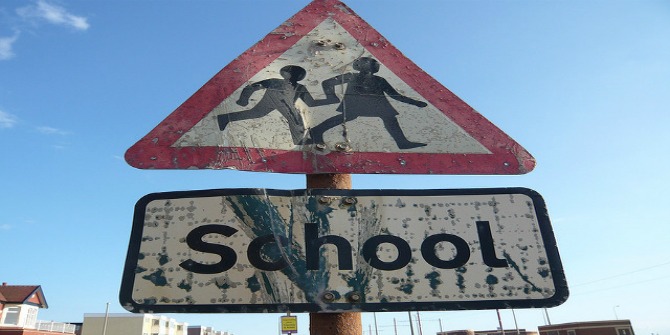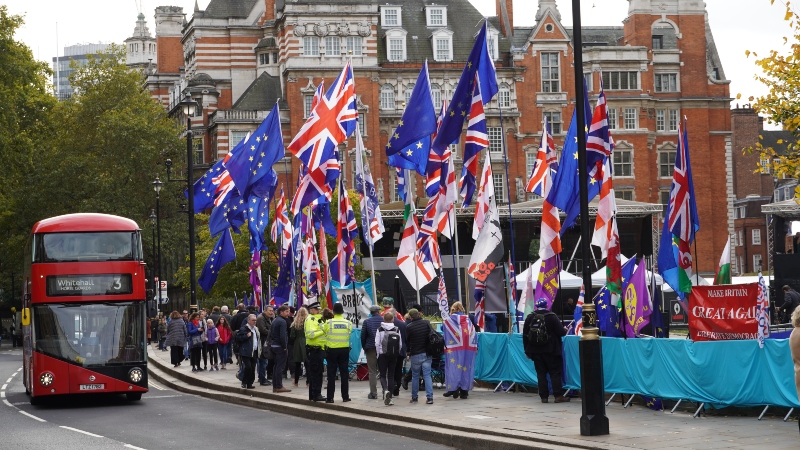 Labour might want to tweak the UK/EU trade deal at some stage, but a soft Brexit in the form of a customs union with the EU, or a return to the EU Single Market, has been ruled out. This is because a soft Brexit would lack the democratic legitimacy of EU Membership, writes Derrick Wyatt.
Labour might want to tweak the UK/EU trade deal at some stage, but a soft Brexit in the form of a customs union with the EU, or a return to the EU Single Market, has been ruled out. This is because a soft Brexit would lack the democratic legitimacy of EU Membership, writes Derrick Wyatt.
The UK/EU Trade and Cooperation Agreement – the current UK-EU trade deal – is described as a ‘hard’ Brexit because some politicians have argued for a ‘soft’ Brexit. A soft Brexit would mean the UK joining a customs union with the EU, and/or UK membership of the EU Single Market.
Sir Keir Starmer said in January 2021 that there were ‘bits’ of the UK-EU trade deal that ‘already need to be improved upon’, but he ruled out any ‘major renegotiation’ of the deal. It follows that for Labour, a customs union with the EU, and joining the EU Single Market, are off the table.
In an earlier blog I said there were good reasons why Keir Starmer had ruled out the UK rejoining the EU. Here I argue that there are good reasons for ruling out a soft Brexit. One good reason might be that such a policy could lose more votes in so-called ‘red-wall’ seats than it would gain elsewhere. I shall leave that to others to evaluate. The good reason I would offer is that any soft Brexit which the EU would agree to would be an undemocratic option for the UK because it would mean accepting EU decisions on key issues without the UK having any say.
Soft Brexit via a Turkish-style customs union with the EU
The Turkey/EU customs union requires Turkey to apply the same tariffs on its imports of industrial goods from non-EU (‘third’) countries as the EU does. That means Turkey can’t be used as a low-tariff route for exports from those countries into the EU. And it means that imports into the EU from Turkey don’t need paperwork and checks to see if they contain third country components that should be subject to tariffs. So far so good.
But while Turkey is bound by the EU’s agreements with third countries, it is not entitled to tariff-free access to their markets. For that it needs to negotiate its own trade deals with those countries. That is easier said than done. A country with a trade agreement with the EU gets tariff free access to the Turkish market anyway, making it difficult or impossible for Turkey to get a trade deal of its own with that country. In addition, Turkey has no say in the terms of any trade agreements that the EU negotiates with third countries and can be bound to grant trade concessions it would never have offered if it been negotiating for itself.
Turkey’s customs union is a bad deal for Turkey. A customs union along these lines would be a bad deal for the UK too.
Labour’s customs union proposal
The customs union Labour said it would negotiate with the EU if it won the 2019 election would have avoided the defects of the Turkish model. The UK and the EU would act jointly in making trade deals with countries around the world, and the UK would ‘have a say’ in the making of those agreements.
The problem was and is that the EU would never accept such an arrangement. A major sticking point would be giving the UK a say in the negotiation of EU trade agreements with third countries. The EU would need to give the UK a vote of some sort when the negotiating mandate for the Commission is set by the Council, and at the close of negotiations, when the Council agrees to sign an agreement which has been negotiated. There would also need to be some mechanism for the UK to influence the course of negotiations.
It might be said that the UK could always be given the safeguard of excluding itself from an agreement if it did not approve of the outcome. But that would not be a solution. It would be back to the Turkish model. It would leave the UK bound by the new agreement, under the terms of its customs union with the EU, but unable to take advantage of the terms of that agreement in its trade with the third country concerned.
No UK Government would be likely to agree to being bound by trade agreements negotiated on its behalf by the EU unless it had a genuine say in the negotiation and conclusion of those agreements. That would be essential to ensure democratic accountability to the UK Parliament and electorate. But the EU would never agree to giving the UK a say in negotiating and concluding trade agreements, and in effect making the UK a sort of associate Member of the EU. That would be precisely the sort of ‘cherry-picking’ that the EU has always rejected.
The option of a permanent customs union with the EU, along the lines envisaged by the Labour Party in 2019, was never a practical option. Labour now seems to have accepted that.
Soft Brexit via the ‘Norway’ option
An alternative route to a soft Brexit would be for the UK to adopt an economic relationship with the EU similar to that of Norway. Norway is one of three EFTA States (Norway, Iceland and Liechtenstein) which have an agreement with the EU whereby they participate in the EU Single Market, apply EU Single Market legislation, and make significant financial contributions to EU projects.
In practice, the EFTA States have no choice but to adopt new EU rules. The EFTA States are free to negotiate their own trade agreements with other countries because they are not part of the EU customs union. Since they are not part of the customs union, there are customs checks on trade between the EFTA countries and EU countries, and tariffs are imposed on goods containing significant non-EFTA or non-EU components.
The free movement of workers
The free movement of workers would return under any variation of the Norway model likely to secure EU agreement. It seems that most people in the UK now think it was a mistake to leave the EU, and that a narrow majority supports rejoining the EU. This suggests that free movement is something the public overall is willing to accept, though it could be a vote-loser in some and perhaps many constituencies. But if free movement might not be fatal to the prospect of a Norway-type soft Brexit, the UK being subject to EU laws without having any influence over the content of those laws very likely would be.
The Norway model would hand over regulation of British businesses to the governments of their major competitors
The impression that EU Single Market laws are only concerned with technical rules that nobody need care about is a false one. They regulate in one way or another subject matter that is economically and politically important. A non-exhaustive list includes transport by air, road, rail and sea, pollution and the fight against global warming, company law, the award of public contracts, state support for businesses, energy markets, take-overs and mergers, the activities of advertisers, lawyers, banks and insurance companies and the National Health Service.
The EFTA States do not apply Single Market tax harmonisation rules, but the UK might be expected to do so. And France might insist that the UK rejoin the common fisheries policy, to restore France’s pre-Brexit fishing quotas in UK waters.
As a Member State of the EU, it was the UK’s influential participation in the EU legislative process (with a veto in some cases) which gave democratic legitimacy to the application of EU law in the UK. If the UK embraced a soft Brexit along the lines of the Norway model, the UK would have no say in the making and amendment of EU law which applied in the UK, and that democratic legitimacy would be lacking.
An independent Committee appointed by the Norwegian Government reported that ‘Norway is in practice bound to adopt EU policies and rules …without voting rights.’ It noted that ‘this democratic deficit is the price Norway pays for enjoying the benefits of European integration without being [an EU Member].’ It is highly unlikely that any UK Government and Parliament would be willing to sign a blank legislative cheque to the EU as the price of a soft Brexit.
____________________
 Derrick Wyatt, QC, is Emeritus Professor of Law at the University of Oxford, and former barrister specialising in litigation before the EU Courts. He has advised government bodies and businesses on legal issues relating to the EU internal market, the environment and climate change. He is a Member of the International Academic Council of Fundacion Fide, an independent and non-partisan Spanish think-tank.
Derrick Wyatt, QC, is Emeritus Professor of Law at the University of Oxford, and former barrister specialising in litigation before the EU Courts. He has advised government bodies and businesses on legal issues relating to the EU internal market, the environment and climate change. He is a Member of the International Academic Council of Fundacion Fide, an independent and non-partisan Spanish think-tank.
Photo by Viktor Forgacs on Unsplash







